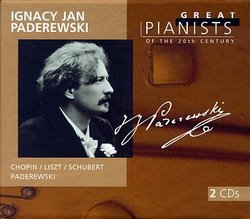| All Artists: Ignacy Jan Paderewski, Chopin, Liszt, Schubert Title: Great Pianists 74 Members Wishing: 1 Total Copies: 0 Label: Philips Release Date: 4/13/1999 Genres: Dance & Electronic, Rock, Classical Styles: Chamber Music, Forms & Genres, Sonatas, Historical Periods, Classical (c.1770-1830), Modern, 20th, & 21st Century, Romantic (c.1820-1910) Number of Discs: 2 SwapaCD Credits: 2 UPC: 028945691923 |
Search - Ignacy Jan Paderewski, Chopin, Liszt :: Great Pianists 74
 | Ignacy Jan Paderewski, Chopin, Liszt Great Pianists 74 Genres: Dance & Electronic, Rock, Classical
|
Larger Image |
CD Details |
CD ReviewsBest in the series, the ultimate 20th century pianist. 07/27/1999 (5 out of 5 stars) "This is the best volume in the Great Pianists of the 20 century series. The playing is a revelation, exquisite, lyrical, and always profound. Each piece is played with a unique sensitivity and disregard for virtuosity. Only having heard of Paderewski, almost as a legend, it is breathtaking to finally behold this "ultimate pianist". It is even more breathtaking, when one realizes every recording was done in one take, years before modern tape editing techniques. (A modern CD of one hour may actually be made from many hours of tapes and remixed, creating marvelous recordings that never really happened, something more like sculpture than musical performance.) The beauty of tone even on these somewhat "hissy" older recordings is a wonder to hear. The Chopin selections makes one seem to hear their beauty again for the first time, more beautiful than any modern recording. The Liszt selections are fantastic. The famous Liszt second rhapsody is done in a lyric non-virtuosic cantabile style that is ravishing with meaning and beauty in every note, a new color every second. It is the ultimate second rhapsody done with pure musicality and avoiding technical excesses. He plays the music, not just Lisztian cadenzas with stuff in between like most modern virtuosos. He makes a beautiful Hungarian tone poem, not a virtuoso exercise in octaves and velocity. Paderewski always strives for beauty of tone and expression and seems to be uninterested in modern pyrotechnics. This is really a must for anyone who loves piano music, a real sojourn back to the days of Liszt and Chopin. Music like it was supposed to be." The Best of All Possible Chopinesque Worlds Manasi Vydyanath | University of Chicago, Chicago | 12/28/2004 (5 out of 5 stars) "I have played and heard innumerable variations on Chopin, and this is probably the best version to date. Paderewski's playing is luminous, he works in fine, detailed textures, uses the presence as well as the absence of emphasis to make very subtle musical points, (especially in the 'tristesse' etude and the raindrop prelude.) He will build up a phrase, create almost unberable anticipation and drop into an intimate whisper at the very moment in which one expects an emphatic declamation. His playing is very unimodal, in that each piece has but one true peak, and the fact that he uses crescendi, accents and even fortes so ascetically makes this peak seem monumental in proportion. Paderewski's arpeggiation of the first chord of the raindrop prelude is nothing short of a stroke of genius. He makes the slightly banal valse brilliante seem mysterious, alluring and so very interesting. In many ways, he is an immortal subjectivist - after a point, the notes cease to be Chopin and become pure Paderewski. I would liken his interpretation to Furtwangler. He has an uncanny sense of rubato, stretching the bar-lines like Kandinsky, but never crossing them. I recommend this very, very highly, as a music-critic and as an artist." Ignacy was not the best pianist, and here is the evidence. forwardintothepast | Madison, WI USA | 01/17/2009 (2 out of 5 stars) "Paderewski was often derided by critics and other pianists of his day for the poor taste and Romantic exaggeration of his playing. This 2-CD set has the recorded evidence of the validity of these accusations on every track. Thus, it is a valueable document for teachers and players to show how someone famous, who could play all the notes and had a stellar career, could be a bad interpreter and performer.
His "feeling" for Romantic repertoire was so eccentric that he makes some of the pieces sound like early jazz or ragtime. To hear it is to believe, and, if you believe in the myth of I.P as a great artist, prepare to have your bubble burst. If you want to confirm what history has generally said about I.P's musicality, this set is perfect. If you like the music, buy another, ANY, other recording. MBB" |

 Track Listings (21) - Disc #1
Track Listings (21) - Disc #1